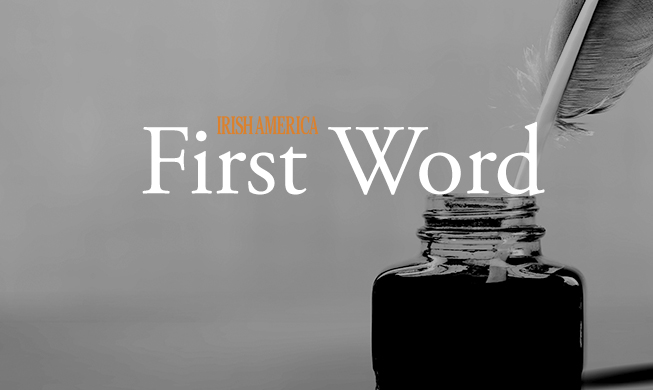
“I’m Serbian,” the waiter answers a little self-consciously. It’s the height of the bombing — maybe it’s not such a good thing to say.
He’s young, no more than a kid really, with short-cropped hair.
My guests for lunch are visiting from Northern Ireland — a couple — he born and bred in Armagh, she born in London of Irish parents. They met in San Francisco where her English accent was a mere curiosity.
They remark how in New York, home to so many from around the world, differences in religion and ethnic background don’t warrant a comment.
We talk a little — the universal language of sports. How Yugoslavia had beaten Ireland 2-0 in Belgrade in a European cup match at the end of last year and how the points will go to Ireland if Yugoslavia is not permitted to play because of the war. “It will never happen,” the waiter says, shock registering on his face. “That would be a terrible thing,” he says shaking his head.
Rad puts a face on the conflict in Kosovo; his family (he is the only one in the United States) all live in Belgrade. “I’ve been talking to them and they are not afraid,” he said. “I am scared but they are not, and the more they bomb the more resolute they will become.
“But you understand,” he adds, “you are Irish.”
Rad brings a plate of biscuits; there are only two of a particular cookie and we ask him laughingly how we are supposed to divide them between three.
“We’ll fight over these.”
“Ah yes,” he says, “this is mine and that is yours…”
…and in Northern Ireland that is the road that you march down.
All I can think of is that if Rad was in Belgrade he would be drafted into the army to be killed or kill.
In peacetime children play soccer on the streets of Belgrade and on the streets of Belfast.
Children brought up on myths and legends of dispossession and wrongs at the hands of the enemy.
Brought up in the heritage of hate.
Remember the Battle of the Boyne. Remember the Field of the Blackbirds (where in 1389 the Serbs were defeated by the Turks).
An eye for an eye.
No surrender.
Serbs consider Kosovo the cradle of their civilization and a place that can never be surrendered.
No surrender. How often throughout the century have we heard that rallying cry in Northern Ireland?
The television overhead shows the latest pictures. Today’s refugees resemble those of the war in 1912 when in the aftermath of the Austrian defeat the Serbs were butchered by the Muslim Albanians.
Victim becomes aggressor.
An Albanian woman is making soup from grass on a portable stove. It’s for the children because they were crying.
(“They had to eat grass,” the nuns in school told us, speaking of the Irish famine.)
“How can this be happening to us in the 20th century?” the woman asks.
They are us.
Every inch of footage from the Balkans reminds us how precious the peace is in Northern Ireland. (Read Nell McCafferty’s piece in this issue on what happens when hatred produces a car bomb that murders a woman, the mother of three, whose only interest lay in promoting basic human rights.)
As we go to press that peace is in grave danger of disintegrating, as David Ervine (leader of the Progressive Unionist Party) reminded us in remarks made to the National Committee on American Foreign Policy recently. (See pg. 65).
Once again the people of Northern Ireland stand frighteningly close to the brink of violence. And the hope of the future, the Good Friday Agreement, is in danger of being parked.
The Agreement took years of effort, years of endless talk and compromise by all involved before it was signed by all the parties. It had democracy as its heart and power-sharing as its life’s blood. And the majority of the people in Northern Ireland voted for it as a new vision that would lead their divided society down the road of equality.
Now David Trimble is using decommissioning of weapons by the IRA as a precondition to Sinn Féin taking their seats in the new governing body.
In doing so he is trying to rewrite the Agreement. And the British and Irish governments, instead of insisting that the Agreement be implemented as written, have sidetracked with what amounts to an ultimatum to the IRA in the guise of the Hillsborough Declaration.
No democracy can survive without representation of all its people, whether they be Albanian or Serb, nationalist or loyalist.
The century began with blood being spilled in the Balkans and in Ireland. As the century closes it seems certain to end that way.
Editor’s Note: This article was originally published in the June/July 1999 issue of Irish America. ⬥


Leave a Reply